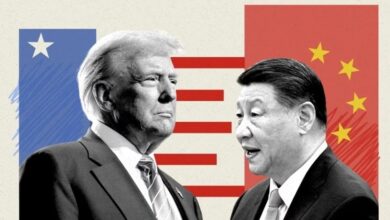Apple Removes WhatsApp and Threads from China App Store Amid Security Concerns
As Apple navigates these challenges, its decisions regarding app availability in China and supply chain diversification reflect the intricate interplay between geopolitics, technology, and business interests on the global stage.

In response to an order from China’s Internet regulator citing security risks, Apple has taken the step to remove Meta Platforms’ WhatsApp and Threads from its China App Store. This decision underscores the heightened scrutiny of foreign tech services operating within China’s digital landscape and adds to the ongoing geopolitical tensions between the US and China.
The move to remove WhatsApp and Threads comes amidst broader concerns about data security and privacy in the digital sphere. With over 2 billion monthly active users globally, WhatsApp is one of the most widely used messaging platforms worldwide. Threads, another offering from Meta Platforms, gained significant traction, ranking as the fourth most downloaded service in global app stores in December, according to Appfigures.
The Cyberspace Administration of China’s directive to remove these apps underscores the government’s stance on safeguarding national security interests. Apple, in a statement, emphasized its compliance with local laws, stating, “We are obligated to follow the laws in the countries where we operate, even when we disagree.”
This action by China’s regulatory body closes a loophole that previously allowed Chinese users to access major western social media platforms through domestic app stores, despite official blocks. While the removal of WhatsApp and Threads from the China App Store limits access for Chinese users, they still have the option to download and use these apps via virtual private networks or by accessing stores in other countries.
China’s move to regulate mobile app developers, requiring them to register with the government, underscores the government’s efforts to assert greater control over the digital landscape. The Ministry of Industry and Information Technology’s scrutiny of app developers and subsequent actions highlight the government’s commitment to monitoring and regulating online platforms.
The decision to remove WhatsApp and Threads from the China App Store marks another chapter in the complex relationship between tech giants and Chinese regulators. Meta founder Mark Zuckerberg’s efforts to cultivate relations with the Chinese government, including learning Mandarin and engaging with Chinese President Xi Jinping, reflect the company’s aspirations to gain a foothold in the Chinese market. However, despite these efforts, Meta’s platforms, including Facebook and Instagram, remain inaccessible in China, with WhatsApp and Threads now joining the list of banned services.
The broader context of US-China relations adds another layer of complexity to Apple’s operations and supply chain management. With tensions between the two countries escalating, Apple faces pressure to diversify its supply chain and reduce reliance on Chinese manufacturing. The geopolitical dynamics between the US and China continue to shape the strategies of tech companies operating in the region, influencing decisions related to market access, regulatory compliance, and supply chain resilience.
As Apple navigates these challenges, its decisions regarding app availability in China and supply chain diversification reflect the intricate interplay between geopolitics, technology, and business interests on the global stage.






